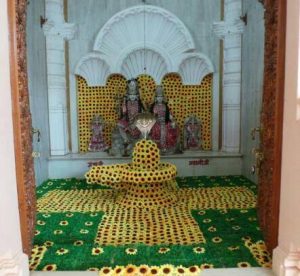Day 19 – Lord Vishnu Explains: Lord Brahma, Lord Shiv and I are one
 Daksha’s Yagya was re-started. This time, as Lord Shankar was respected with devotion, Lord Vishnu presented himself at the end and everyone prayed to Lord Vishnu. Lord Vishnu then explained to Daksha in the presence of everyone, “Daksha, those who discriminate amongst me, Brahma and Vishnu are fools. We are one but present in three different forms. I create in the form of Brahma, protect in the form of Vishnu and destroy in the form of Shiv. Those who insult one of us do not attain the grace of either one of us”.
Why the quarrel then between the believers of Lord Shiv and Lord Vishnu? Such quarrels used to happen even during the times of Shri Tulsidasji. When Shri Ram established and did pooja of Bhagavan Rameshwar, he said,
“Shiv drohi mama bhagat kahaava, so nar sapanehu mohi na paava”
“One who calls myself his devotee but is a Lord Shiv traitor, will not attain me even in one’s dreams”.
Nevertheless, there are narrow-minded people who misinterpret this verse as: those who are unfaithful to Lord Shiv will be called my devotees. This is pitiful. Such people do not chant Lord Shiv’s name. Even today you see that some people will avoid the street with a Shivji’s temple. Only those who are blessed can chant Lord Shiv’s name. In fact, when one dies, where is one taken? To a crematorium. And who resides in a crematorium? Lord Shiv. Thus in the end, one has to take Lord Shiv’s refuge without which one cannot attain their own welfare.
Dharma (righteousness) does not make one narrow-minded. Instead, it widens one’s vision. See your God of faith in all deities and bow to them. Do not oppose others. Narsinh Mehta sings:
sakal lok maa sahune vande, ninda na kare keni re;
vaach kaach man nischal raakhe, dhanya dhanya janani teni re.
A devotee of Vishnu is one who does not dishonour anyone but respects everyone. There should not be any dispute between devotees of Shakti, Shiv or Vishnu because there is no difference among these forms. They are all one and at the same time that One presents itself in many forms. This is our spirituality and culture. Our unity is like a water-melon: the outside may look separated in many entities but the inside is in one piece. It is not like a tangerine which appears one from outside but is in fact separated within.
Now, since Sati has gone, Shankarji is engrossed in his prayers.
|